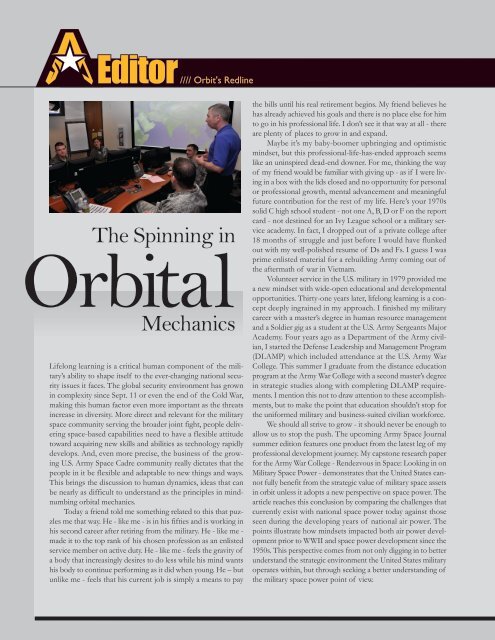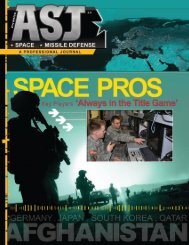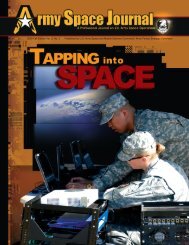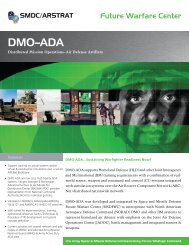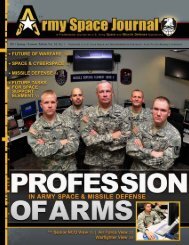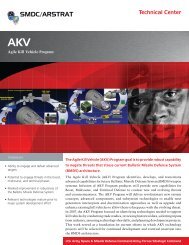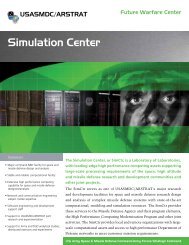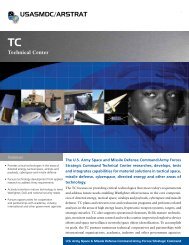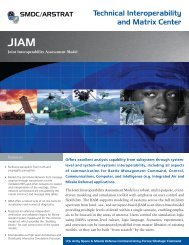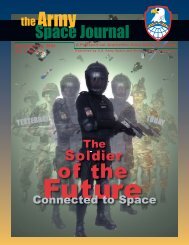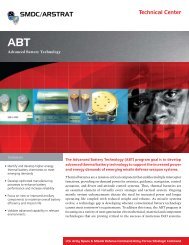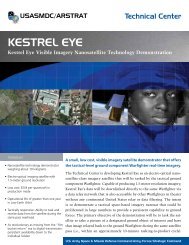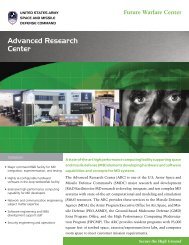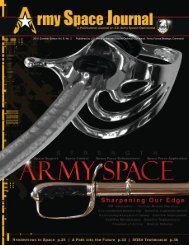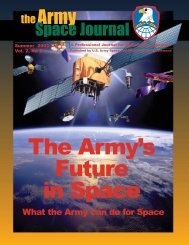Volume 9, Number 1 - Space and Missile Defense Command - U.S. ...
Volume 9, Number 1 - Space and Missile Defense Command - U.S. ...
Volume 9, Number 1 - Space and Missile Defense Command - U.S. ...
You also want an ePaper? Increase the reach of your titles
YUMPU automatically turns print PDFs into web optimized ePapers that Google loves.
Editor //// Orbit's Redline<br />
The Spinning in<br />
Orbital<br />
Mechanics<br />
Lifelong learning is a critical human component of the military’s<br />
ability to shape itself to the ever-changing national security<br />
issues it faces. The global security environment has grown<br />
in complexity since Sept. 11 or even the end of the Cold War,<br />
making this human factor even more important as the threats<br />
increase in diversity. More direct <strong>and</strong> relevant for the military<br />
space community serving the broader joint fight, people delivering<br />
space-based capabilities need to have a flexible attitude<br />
toward acquiring new skills <strong>and</strong> abilities as technology rapidly<br />
develops. And, even more precise, the business of the growing<br />
U.S. Army <strong>Space</strong> Cadre community really dictates that the<br />
people in it be flexible <strong>and</strong> adaptable to new things <strong>and</strong> ways.<br />
This brings the discussion to human dynamics, ideas that can<br />
be nearly as difficult to underst<strong>and</strong> as the principles in mindnumbing<br />
orbital mechanics.<br />
Today a friend told me something related to this that puzzles<br />
me that way. He - like me - is in his fifties <strong>and</strong> is working in<br />
his second career after retiring from the military. He - like me -<br />
made it to the top rank of his chosen profession as an enlisted<br />
service member on active duty. He - like me - feels the gravity of<br />
a body that increasingly desires to do less while his mind wants<br />
his body to continue performing as it did when young. He – but<br />
unlike me - feels that his current job is simply a means to pay<br />
the bills until his real retirement begins. My friend believes he<br />
has already achieved his goals <strong>and</strong> there is no place else for him<br />
to go in his professional life. I don’t see it that way at all - there<br />
are plenty of places to grow in <strong>and</strong> exp<strong>and</strong>.<br />
Maybe it’s my baby-boomer upbringing <strong>and</strong> optimistic<br />
mindset, but this professional-life-has-ended approach seems<br />
like an uninspired dead-end downer. For me, thinking the way<br />
of my friend would be familiar with giving up - as if I were living<br />
in a box with the lids closed <strong>and</strong> no opportunity for personal<br />
or professional growth, mental advancement <strong>and</strong> meaningful<br />
future contribution for the rest of my life. Here’s your 1970s<br />
solid C high school student - not one A, B, D or F on the report<br />
card - not destined for an Ivy League school or a military service<br />
academy. In fact, I dropped out of a private college after<br />
18 months of struggle <strong>and</strong> just before I would have flunked<br />
out with my well-polished resume of Ds <strong>and</strong> Fs. I guess I was<br />
prime enlisted material for a rebuilding Army coming out of<br />
the aftermath of war in Vietnam.<br />
Volunteer service in the U.S. military in 1979 provided me<br />
a new mindset with wide-open educational <strong>and</strong> developmental<br />
opportunities. Thirty-one years later, lifelong learning is a concept<br />
deeply ingrained in my approach. I finished my military<br />
career with a master’s degree in human resource management<br />
<strong>and</strong> a Soldier gig as a student at the U.S. Army Sergeants Major<br />
Academy. Four years ago as a Department of the Army civilian,<br />
I started the <strong>Defense</strong> Leadership <strong>and</strong> Management Program<br />
(DLAMP) which included attendance at the U.S. Army War<br />
College. This summer I graduate from the distance education<br />
program at the Army War College with a second master’s degree<br />
in strategic studies along with completing DLAMP requirements.<br />
I mention this not to draw attention to these accomplishments,<br />
but to make the point that education shouldn’t stop for<br />
the uniformed military <strong>and</strong> business-suited civilian workforce.<br />
We should all strive to grow - it should never be enough to<br />
allow us to stop the push. The upcoming Army <strong>Space</strong> Journal<br />
summer edition features one product from the latest leg of my<br />
professional development journey. My capstone research paper<br />
for the Army War College - Rendezvous in <strong>Space</strong>: Looking in on<br />
Military <strong>Space</strong> Power - demonstrates that the United States cannot<br />
fully benefit from the strategic value of military space assets<br />
in orbit unless it adopts a new perspective on space power. The<br />
article reaches this conclusion by comparing the challenges that<br />
currently exist with national space power today against those<br />
seen during the developing years of national air power. The<br />
points illustrate how mindsets impacted both air power development<br />
prior to WWII <strong>and</strong> space power development since the<br />
1950s. This perspective comes from not only digging in to better<br />
underst<strong>and</strong> the strategic environment the United States military<br />
operates within, but through seeking a better underst<strong>and</strong>ing of<br />
the military space power point of view.


